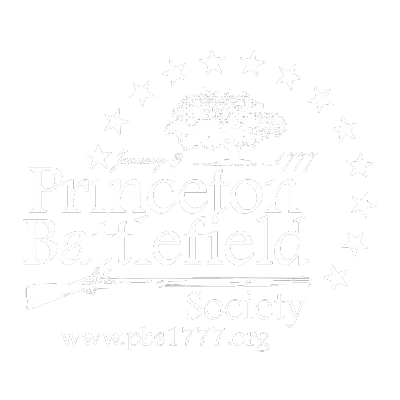Princeton Battlefield Society
The Road to Independence Runs Through Us
The Princeton Battlefield Society (PBS) is dedicated to protecting, preserving, and promoting the site of one of the most pivotal battles of the American Revolution—the Battle of Princeton on January 3, 1777. This battle was a turning point in the fight for independence, where ordinary men did extraordinary things to shape the future of a nation.

Welcome to the Princeton Battlefield Society
What Happened Here?
On the morning of January 3, 1777, American soldiers, under the command of General George Washington, defeated British Crown forces at the Battle of Princeton. This victory marked a pivotal moment in the American Revolution.
- The victory at Princeton boosted morale and strengthened the fight for independence.
- It elevated Washington’s military leadership, solidifying his role in shaping the nation.
- The battlefield remains a vital educational resource, offering insight into the sacrifices made for American freedom.
GET INVOLVED NOW
Experience History Today
Step into history
Join a guided tour of Princeton Battlefield and walk the very ground where American independence took shape. Our tours bring the past to life through expert storytelling and rich historical insights. Every ticket supports preservation and education.
Donate to support
Preserve history with your generosity. Your donation helps protect the Princeton Battlefield, restore historic landmarks, and expand educational programs that bring the past to life. Every contribution ensures that this historic site remains a place of learning and reflection for generations to come.
Heroes of Princeton
Do you know of a Patriot who took part in the battle on January 3, 1777? Share their name and story with us as we work to preserve and tell the full history of that day. Every story helps keep their memory alive.
Eyewitness of the American Revolution
Thomas Clarke
As part of the Princeton Battlefield Society’s Eyewitness of the American Revolution initiative, we are proud to present our latest video on Thomas Clarke. This project was made possible through a 2024 grant from the Mercer County Cultural & Heritage Commission.
As part of the Princeton Battlefield Society’s Eyewitness of the American Revolution initiative, we are proud to present our latest video on Thomas Clarke. This project was made possible through a 2024 grant from the Mercer County Cultural & Heritage Commission.
Watch the video to learn more about Thomas Clarke’s role in history.
Support Historic Preservation
Your contribution keeps history alive.
When you join us, you help protect the historic resources at the Princeton Battlefield, the Thomas Clarke House (a witness to the January 3, 1777, Battle of Princeton), and advance the history and heritage of America’s Revolutionary War. The battlefield serves as a stage to bring public history and educational programs to life—inspiring an awareness, understanding, and appreciation of the American Revolution and the legacy of the Battle of Princeton.
Bring History to Life
Upcoming events
- October 23, 2025
- 7:00 pm- 8:30 pm
- Washington Crossing Historic Park
Join us for an unforgettable evening at Washington Crossing Historic Park, featuring an exclusive advance screening of The American Revolution, the highly anticipated new PBS documentary series from Ken Burns, Sarah Botstein, and David Schmidt.

OUR TESTIMONIALS
What our visitors say
Every year, visitors from across the country walk the historic grounds of the Princeton Battlefield, reflecting on the bravery, sacrifice, and significance of this pivotal moment in American history.
OUR LATEST NEWS
Beyond the Battlefield Blog & News
The Road to Independence on the March to Destiny
December 1775: Winter Hardship, Bold Gambles, and the Long Road

Battlefield Looks Forward to a Refurbished Future
Battlefield Looks Forward to a Refurbished Future BATTLEFIELD RESTORATION: Reconstruction
This Month in Revolutionary History: Key Moments from November
November 1775: A Month of Escalation, Resolve, and Reckoning As
Be a part of History
Step into history and make a difference. Our volunteers play a vital role in preserving the battlefield, leading tours, supporting educational programs, and assisting at special events
